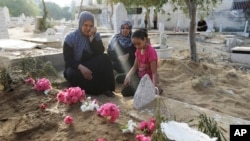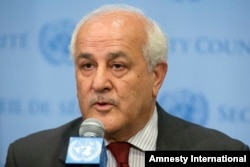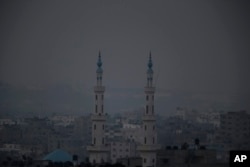The 21-day conflict between Israel and Hamas militants already has killed more than 1,000 people and displaced at least 167,000 Palestinians, the U.N.'s main agency in Gaza said. Most of the Palestinian dead have been civilians. Israel says it has lost 43 soldiers and three civilians.
An explosion that rocked a hospital Monday threatened to escalate tensions, with conflicting reports about who was to blame. Hamas contended an Israeli drone hit Shifa Hospital; the Israelis said the attack came from a failed Hamas rocket.
The U.N. council adopted the presidential statement at an emergency meeting just after midnight Sunday as Muslims started celebrating the Eid al-Fitr holiday, which marks the end of the fasting month of Ramadan.
Hours before the U.N. action, U.S. President Barack Obama phoned Israeli Prime Minister Benjamin Netanyahu to demand an "immediate, unconditional humanitarian cease-fire."
But Netanyahu rejected the demand, later telling U.N. chief Ban Ki-moon that it dealt with "the needs of a murderous terrorist group that attacks Israeli civilians" while neglecting the security needs of the Jewish state.
In a U.S. television interview, Hamas leader Khaled Meshaal demanded that Israel end its occupation of Gaza and said he would not recognize Israel's right to exist.
The U.N.'s secretary-general on Monday repeated his call for calm.
"The temporary weekend pause in fighting brought a brief respite to war weary civilians; it also revealed how much the massive Israeli assault has devastated the lives of the people of Gaza," Ban said. "We saw scenes of indiscriminate destruction. Some described it as a manmade hurricane.”
Ban said that beyond a cease-fire, the warring sides have a responsibility to resolve long-standing root causes of their years-long conflict "to break the seemingly endless cycle of violence and suffering." He said Israel must end its blockade of Gaza and "nearly half century of occupation," while Palestinians must agree to "security for Israel."
US calls for break in fighting
U.S. Secretary of State John Kerry, who met last week with Ban and other world leaders to address the crisis, on Monday repeated the call for calm.
"Today, we are continuing to work toward establishing an unconditional humanitarian cease-fire, one that would honor Eid" and stop the fighting, he said in brief, televised comments Monday.
"We believe the momentum generated by a humanitarian cease-fire is the best way to find out if you can put in place a sustainable cease-fire," one that would provide more time to address grievances behind the fighting, Kerry said.
Kerry emphasized the United States' support for Israel to "address the threat ... posed by tunnel attacks," and said any resolution to the Gaza crisis "must lead to the disarmament of Hamas and all terrorist groups."
Gaza Strip residents and Reuters witnesses said Israeli shelling and Hamas missile launches slowly subsided on Sunday.
However, the Israeli military said Monday that it had carried out three airstrikes on Gaza, targeting Hamas rocket launchers and infrastructure in the strip.
The military said Israeli jets hit two rocket launchers and a rocket manufacturing facility in central and northern Gaza Monday.
The strikes broke a relative lull in the fighting at the start of a major Muslim holiday.
UN declaration
Palestinian Ambassador to the U.N. Riyad Mansour said he hoped the U.N. statement would lead to a long cease-fire, but criticized the Security Council for not taking the stronger action of adopting a resolution against what he called Israel's "aggression."
“We were expecting the Security Council to deal with the issue of providing protection of our people and to deal with legitimate concerns of our people in the Gaza Strip. The status quo is not sustainable, and to return to the situation before this aggression is not sustainable," Mansour said.
Israeli Ambassador to the U.N. Ron Prosor said Hamas has fired 2,500 rockets at Israel, and reiterated that if Israel were not facing rocket attacks, it would not need to carry out its own strikes.
“We did everything we could to avoid this conflict, but Hamas refused to stop the attacks. Israel agreed to five cease-fire proposals; Hamas rejected or broke all of them, even the ones that they requested themselves," Prosor said.
He said the Security Council statement was lacking in the specific mention of Hamas, militant rocket fire or Israel's right to defend itself.
The Security Council statement, drafted by Jordan, “urged all parties to accept and fully implement the humanitarian ceasefire into the Eid period and beyond” and “calls on parties to engage in efforts to achieve a durable and fully respected ceasefire, based on the Egyptian initiative.”
The call for a cease-fire follows new attacks launched by Israel and Hamas despite going back and forth over proposals for another temporary halt to nearly three weeks of fighting.
US-Israel relations
Israel sees no need for another Gaza cease-fire, an Israeli official was quoted as saying on Monday, as tensions between Prime Minister Benjamin Netanyahu's government and Washington flared over U.S. mediation to end the almost three-week-old war.
Fighting had subsided over the weekend, with the battered Palestinian enclave's dominant Hamas Islamists endorsing a U.N. call for a 24-hour halt ahead of Monday's Eid al-Fitr festival.
Yet Israel balked, having abandoned its own offer to extend a 12-hour truce from Saturday as Palestinian rocket launches persisted. Netanyahu's security cabinet met into the early hours of Monday to debate proposals including for an escalation of the Gaza offensive in which almost 1,100 people have died.
Diplomatic efforts led by U.S. Secretary of State John Kerry to end the conflict have shown little sign of progress. Israel and Hamas have set conditions that appear irreconcilable.
The council, however, commended the efforts of Kerry and United Nations Secretary-General Ban Ki-moon, who spent last week in the Middle East trying to help broker an end to the fighting.
But U.S. President Barack Obama, phoning Netanyahu on Sunday, put pressure on Israel to hold fire unconditionally and appeared to link its core demand for Hamas to be stripped of cross-border rockets and infiltration tunnels to a peace accord with the Palestinians that is nowhere on the diplomatic horizon.
“The president stressed the U.S. view that, ultimately, any lasting solution to the Israeli-Palestinian conflict must ensure the disarmament of terrorist groups and the demilitarization of Gaza,” the White House said.
It added that while Obama wanted any truce to be along the lines of an Egyptian deal that ended the last Gaza war, in November 2012, the United States also supported "regional and international coordination to end hostilities.”
No immediate response
Israel did not immediately respond nor publish what, if anything, was decided at the overnight security cabinet session.
But Israel Radio quoted an unidentified government official as saying: "There is no need for any more ceasefires. Let Hamas stop firing first."
That signaled preference for a de facto mutual halt to fighting rather than any agreement preserving Hamas's arsenals and shoring up its status by improving Gaza's crippled economy.
Two decades of Israeli-Palestinian peace negotiations have made little progress and been frequently interrupted, most recently in April when Netanyahu called off talks overseen by Kerry in response to Abbas's surprise power-share with Hamas.
Speaking earlier on Sunday, Netanyahu sounded open to easing conditions for the Gaza Strip's 1.8 million Palestinians but said this must be "intertwined" with disarming Hamas.
"I think you can't get social and economic relief for the people of Gaza without having an assured demilitarization," he told CNN.
Palestinian death toll
Israeli air, sea and ground attacks have killed some 1,031 Palestinians, mainly civilians and including many children, Gaza officials say. Israel says 43 of its soldiers have died, along with three civilians killed by rocket and mortar fire from Gaza.
The Security Council expressed “grave concern regarding the deterioration in the situation as a result of the crisis related to Gaza and the loss of civilian lives and casualties” and “reiterates the need to take appropriate steps to ensure the safety and well-being of civilians and their protection.”
Meanwhile, the Israeli army released on Monday footage said to show forces preparing and executing the detonation of a militant tunnel network leading from Gaza into Israel.
In the video, a tunnel shaft is seen ahead of its detonation. The explosion in two locations along the tunnel route is also seen in an aerial image.
Israel said the Palestinians have lost around half of their rockets during the fighting - an account disputed by Hamas - and that army engineers have located and destroyed most of the tunnels from the territory.
Those excavations will continue under any short-term truce, Israel says.
A poll published by Israel's Channel 10 television on Sunday said some 87 percent of respondents wanted Israel to continue the operation until Hamas was toppled. Another poll, published in the Jerusalem Post newspaper, found that 86.5 percent of Israel's majority Jews opposed calling a truce while rocket fire continued and Gaza retained any of the cross-border tunnels.
The main U.N. agency in Gaza, UNRWA, said 167,269 displaced Palestinians have taken shelter in its schools and buildings, following repeated calls by Israel for civilians to evacuate whole neighborhoods ahead of military operations.
But residents of villages near the southern town of Khan Younis on Sunday attacked offices of the International Committee of the Red Cross, torching furniture and causing damage. They said the organization had not done enough to help them.
During the lull in fighting inside Gaza on Sunday, residents flooded into the streets to discover scenes of massive destruction in some areas, including Beit Hanoun in the north and Shejaia in the east.
An Israeli official said the army hoped the widespread desolation would persuade Gazans to put pressure on Hamas to stop the fighting for fear of yet more devastation.
The Gaza turmoil has stoked tensions amongst Palestinians in mainly Arab East Jerusalem and in the occupied West Bank, which Abbas governs in uneasy coordination with the Israelis.
Medics said eight Palestinians were killed on Friday in incidents near the West Bank cities of Nablus and Hebron – the sort of death toll reminiscent of previous anti-Israel revolts.
VOA's Margaret Besheer contributed to this report from the United Nations. Some information also provided by Reuters, AFP and AP.






